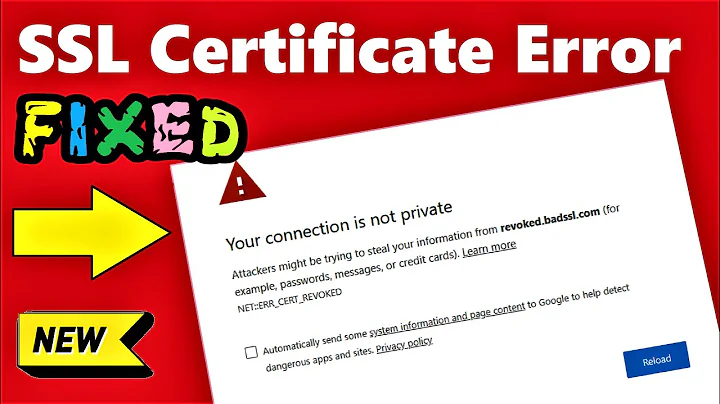Can not get rid of `net::ERR_CERT_COMMON_NAME_INVALID` error in chrome with self-signed certificates
Chrome 58+ no longer matches the Common Name (CN) in certs.
Now it uses Subject Alternative Names (SAN) instead.
SAN must contain proper DNS or IP entry.
- When DNS is used, it should be a resolvable FQDN name.
- When an IP address is used, it should be explicitely specified as
such within the
SANchain.
That said, this should work :
openssl req \
-newkey rsa:2048 \
-x509 \
-nodes \
-keyout file.key \
-new \
-out file.crt \
-subj /CN=Hostname \
-reqexts SAN \
-extensions SAN \
-config <(cat /etc/ssl/openssl.cnf \
<(printf '[SAN]\nsubjectAltName=DNS:hostname,IP:192.168.0.1')) \
-sha256 \
-days 3650
Related videos on Youtube
Ashesh
Updated on September 18, 2022Comments
-
 Ashesh over 1 year
Ashesh over 1 yearThere are numerous question on the web where people are having difficulty setting up self signed certificates for use on internal network.
Just to link a few:
Getting Chrome to accept self-signed localhost certificate
Chrome accept self-signed localhost certificate
Generating a self-signed cert with openssl that works in Chrome 58
StartCom certificate Error : ERR_CERT_AUTHORITY_INVALIDI have gone through each and every one of them but still can't get rid of the
(net::ERR_CERT_COMMON_NAME_INVALID).error.Steps followed:
-
key & certificate generation on server
openssl req \ -newkey rsa:2048 \ -x509 \ -nodes \ -keyout file.key \ -new \ -out file.crt \ -subj /CN=Hostname \ -reqexts SAN \ -extensions SAN \ -config <(cat /etc/ssl/openssl.cnf \ <(printf '[SAN]\nsubjectAltName=DNS:192.168.0.1')) \ -sha256 \ -days 3650 setting up server process (apache) to use the newly generated certificate and key file for secure connections
- exporting certificate file from the server on to the client by navigating to https://192.168.0.1:3122 through Chrome Dev Tools and using the Export option
- adding the CA to list of known Certificate Authorities (on Fedora 26) using
certutilsudo cp file.crt /etc/pki/ca-trust/source/anchors; sudo upate-ca-trust
- restarting chrome
I have also tried various values for the
CNfield above like:hostname,common.name.com,Common Name,192.168.0.1Even after all this the error persists when I navigate to https://192.168.0.1:3122 and I no longer know what I am doing.
The text representation looks similar to:
Certificate: Data: Version: 3 (0x2) Serial Number: 9e:ae:33:24:3a:2d:2b:e2 Signature Algorithm: sha256WithRSAEncryption Issuer: CN = Hostname Validity Not Before: Oct 28 20:18:06 2017 GMT Not After : Oct 26 20:18:06 2027 GMT Subject: CN = Hostname Subject Public Key Info: Public Key Algorithm: rsaEncryption Public-Key: (2048 bit) Modulus: 00:a4:80:6c:3a:1b:5e:c4:e6:f6:7d:a5:be:d6:cd: d9:23:bd:1a:b1:e6:f1:e3:b0:76:47:37:a3:d8:b0: 60:44:23:c3:8a:58:1c:c3:0a:99:3d:42:32:ca:8b: ec:31:9d:a8:df:6c:13:43:e6:78:12:b8:24:04:5a: 9f:6e:11:24:2a:56:e3:20:36:78:a4:cc:ed:45:7c: a3:c1:36:7b:25:f6:6b:2d:01:59:02:74:8b:7a:13: ec:83:63:90:2e:a0:a3:aa:23:de:ea:f0:8e:1f:99: b9:50:b1:5f:64:e4:c9:91:c0:0c:56:15:3c:c0:ff: 0f:bf:e1:af:7a:bf:51:40:37:b0:34:20:95:a1:05: 14:k2:35:20:e8:98:48:65:ad:26:cc:de:a2:50:48: 77:8c:e2:7a:d5:bd:83:96:86:ef:20:79:2f:15:a3: 07:48:f4:1f:c7:9d:a1:4b:bd:ee:47:83:51:f3:09: 27:ed:b7:09:c8:56:40:0c:68:25:92:d8:62:dc:14: 6c:fa:f1:e3:93:1b:79:3c:58:9c:53:69:ff:6a:0f: ee:4c:9f:8e:22:2d:62:6b:b3:ae:22:d6:e3:d0:bd: 06:43:a7:c3:e1:1e:23:07:61:b0:4e:64:14:92:0c: 5b:f1:a8:c5:29:67:64:7d:65:10:b9:60:41:b8:3b: 1y:1f Exponent: 65537 (0x10001) X509v3 extensions: X509v3 Subject Alternative Name: DNS:192.168.0.1 Signature Algorithm: sha256WithRSAEncryption 11:65:6d:86:04:7f:5a:b0:ce:b2:6e:95:7e:03:8c:fe:a9:d0: 81:2c:6f:50:63:2e:91:77:79:cd:27:32:b0:19:2b:ac:ea:c0: 4b:f7:56:d9:be:34:54:f1:a6:1d:bc:d0:3b:bb:bf:90:0e:2d: 1d:83:28:97:8e:f8:37:5d:3e:00:5a:cd:3d:36:5d:c4:5d:a8: 7e:a4:59:f0:91:3d:af:3d:28:03:3e:78:3b:5b:0a:fb:24:34: 02:a2:09:ec:d6:0c:58:63:ab:69:26:5e:fe:1d:1f:19:54:0f: 68:4e:31:f9:de:1e:de:86:81:3f:b7:62:c5:67:02:05:a2:7a: 03:f4:b5:3b:ba:c4:ba:26:8e:a2:ee:1c:ef:69:63:07:b0:97: fd:a8:42:e2:11:6d:de:b5:70:a5:4a:62:d2:62:d9:5b:17:f4: d5:cd:6f:71:75:dd:35:33:55:52:2e:30:29:f8:42:ec:b9:d3: 82:85:a1:e7:f6:f5:90:dd:cb:07:15:a7:44:70:1c:93:e6:ec: 03:3a:be:41:87:3c:f0:a4:88:a5:65:d9:29:2c:78:de:90:b8: 6a:8b:99:6e:d0:e5:8c:08:a4:71:51:fd:1d:e1:8c:0c:17:d5: b0:31:fc:7f:99:23:dd:1a:c4:0b:45:17:68:88:67:c6:22:df: 2b:ac:ea:c0Please note that this is my 1st time setting up SSL/TLS certificates for such purposes. Please advice on how to get rid of the error.
-
 Ashesh over 6 yearsI have added the text representation.
Ashesh over 6 yearsI have added the text representation. -
Crypt32 over 6 yearsI think, Chrome expects IP address to be encoded as IP address in SAN extension, not a DNS name.
-
-
Jason Martin over 6 yearsSpecifically, this is due to tools.ietf.org/html/rfc6125#section-5.7.3.1 which states "For TLS authentication with X.509 certificates, an identity from the DNS namespace MUST be checked against each subjectAltName extension of type dNSName present in the certificate. If no such extension is present, then the identity MUST be compared to the (most specific) Common Name in the Subject field of the certificate." So, if any SAN exists then the CN is not checked.
-
krisFR over 6 yearsCorrect me if i'm wrong, but Chrome no longer accepts certificates that fallback to common name. So even if a SAN does not exist, the CN is not checked. So the SAN seems mandatory.
-
 Ashesh over 6 years@krisFR is right because I already tried with certificates without the SAN extension which failed. Specifying the IP field was the solution.
Ashesh over 6 years@krisFR is right because I already tried with certificates without the SAN extension which failed. Specifying the IP field was the solution. -
abelito about 5 yearsLife saver. For anyone trying this out on Windows, Cygwin comes with a copy of openssl.cnf here: .\cygwin\etc\defaults\etc\pki\tls\ Also, I had to change my CN=hostname and DNS:hostname lines to be localhost instead of hostname
-
yota over 4 yearsWorked perfectly ! Had to add the certificate with this procedure : corvil.com/kb/…
-
 dw1 about 4 yearsI was getting "Not a certification authority" when trying to import certificates generated with this command. I found a solution to create a CA first and it worked: stackoverflow.com/a/60516812 But I think the proper solution is to include an extension/config that sets
dw1 about 4 yearsI was getting "Not a certification authority" when trying to import certificates generated with this command. I found a solution to create a CA first and it worked: stackoverflow.com/a/60516812 But I think the proper solution is to include an extension/config that setsbasicConstraints=CA:TRUEAlso note that if you are using just an IP you would skip theDNS:hostname,part


![[SOLVED] NET ERR_CERT_COMMON_NAME_INVALID Error Problem](https://i.ytimg.com/vi/_Z6UC37e9W4/hq720.jpg?sqp=-oaymwEcCNAFEJQDSFXyq4qpAw4IARUAAIhCGAFwAcABBg==&rs=AOn4CLBLThEL81PhUcp4VtjhQSvXIuSASg)

